Retail Theory and Practice
VerifiedAdded on 2023/01/17
|11
|3090
|73
AI Summary
This report discusses the key changes in the fashion clothing market of the UK and provides strategies and tactics for retailers to respond to these changes. It explores the impact of technological advancements and social trends on the retail industry.
Contribute Materials
Your contribution can guide someone’s learning journey. Share your
documents today.
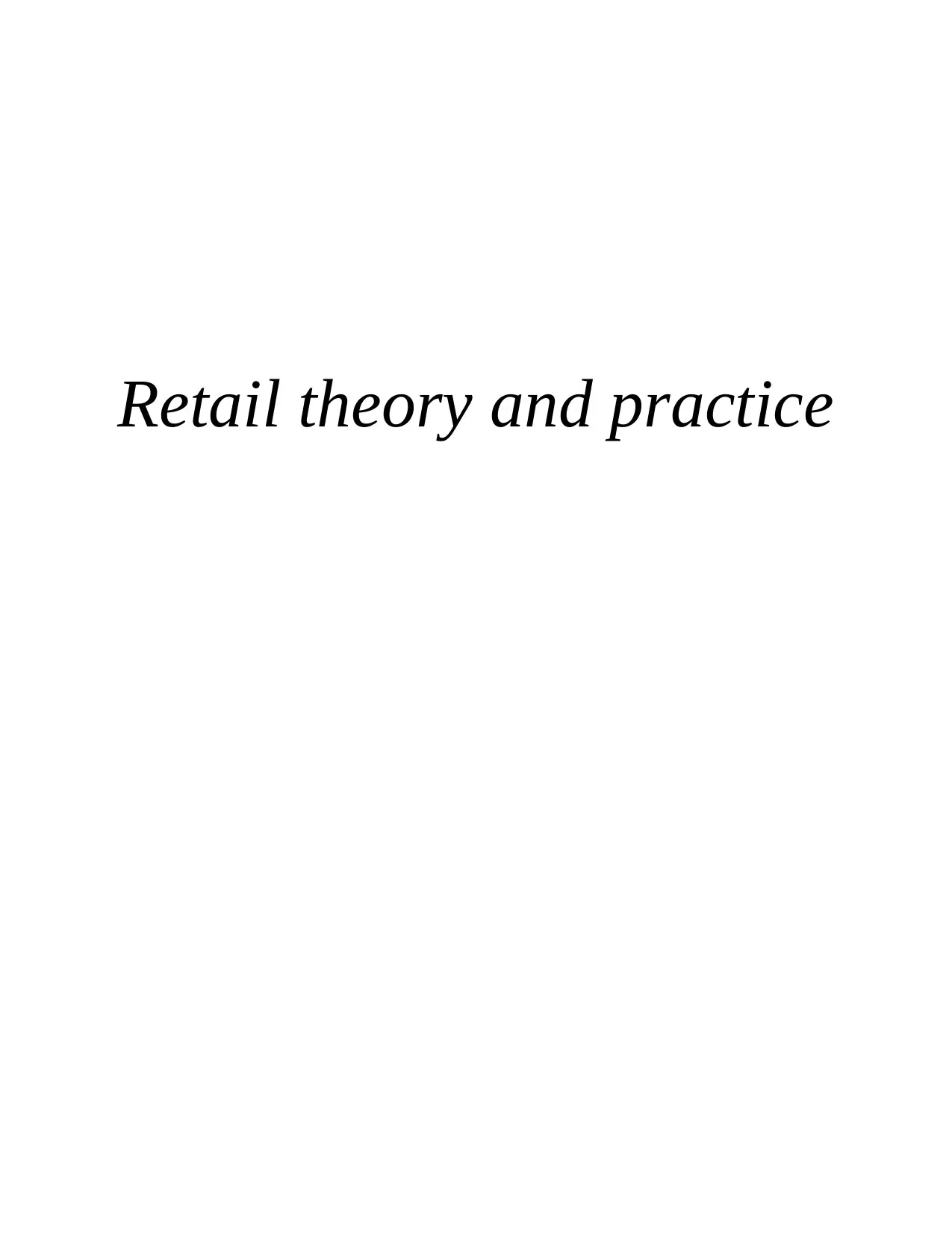
Retail theory and practice
Secure Best Marks with AI Grader
Need help grading? Try our AI Grader for instant feedback on your assignments.
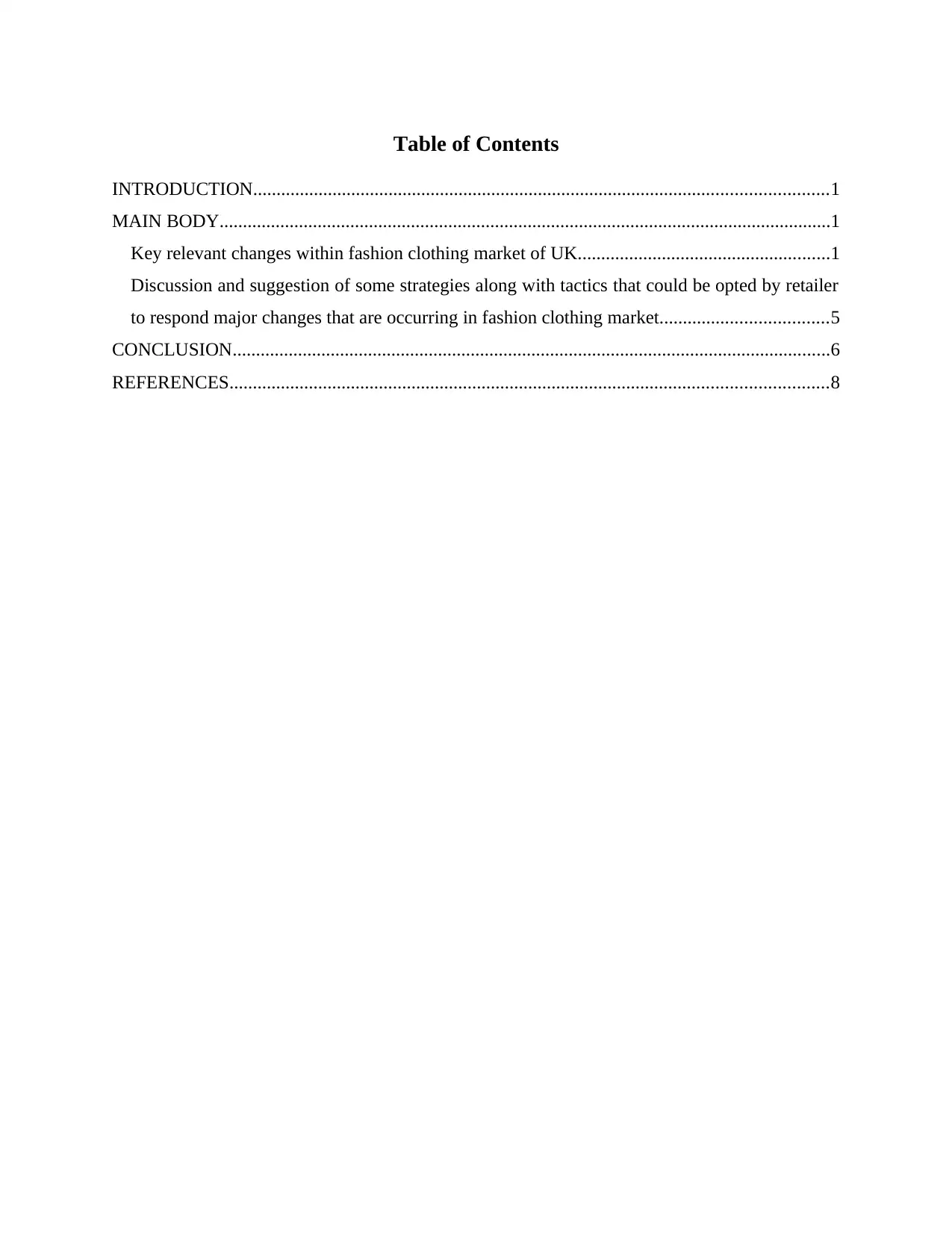
Table of Contents
INTRODUCTION...........................................................................................................................1
MAIN BODY...................................................................................................................................1
Key relevant changes within fashion clothing market of UK......................................................1
Discussion and suggestion of some strategies along with tactics that could be opted by retailer
to respond major changes that are occurring in fashion clothing market....................................5
CONCLUSION................................................................................................................................6
REFERENCES................................................................................................................................8
INTRODUCTION...........................................................................................................................1
MAIN BODY...................................................................................................................................1
Key relevant changes within fashion clothing market of UK......................................................1
Discussion and suggestion of some strategies along with tactics that could be opted by retailer
to respond major changes that are occurring in fashion clothing market....................................5
CONCLUSION................................................................................................................................6
REFERENCES................................................................................................................................8

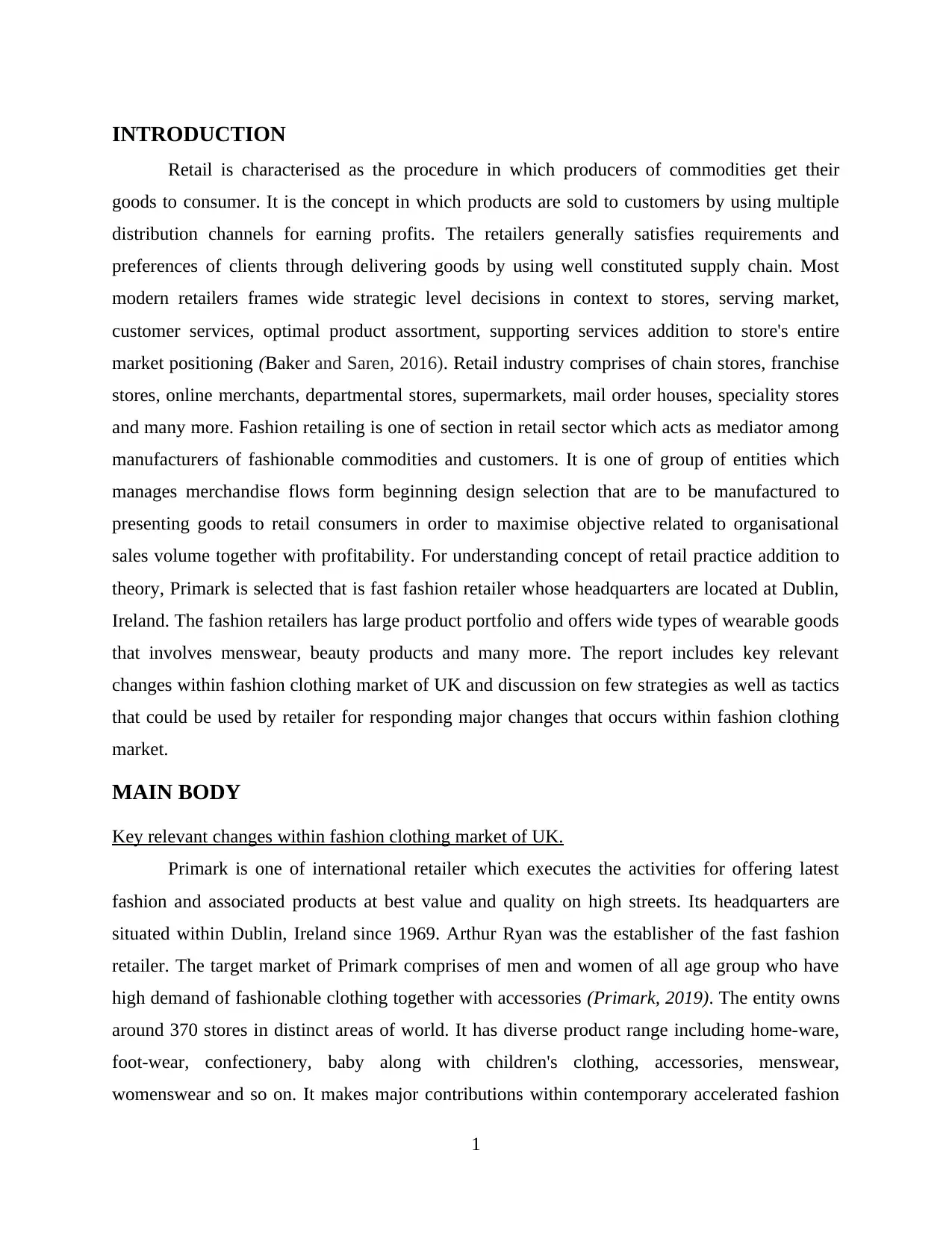
INTRODUCTION
Retail is characterised as the procedure in which producers of commodities get their
goods to consumer. It is the concept in which products are sold to customers by using multiple
distribution channels for earning profits. The retailers generally satisfies requirements and
preferences of clients through delivering goods by using well constituted supply chain. Most
modern retailers frames wide strategic level decisions in context to stores, serving market,
customer services, optimal product assortment, supporting services addition to store's entire
market positioning (Baker and Saren, 2016). Retail industry comprises of chain stores, franchise
stores, online merchants, departmental stores, supermarkets, mail order houses, speciality stores
and many more. Fashion retailing is one of section in retail sector which acts as mediator among
manufacturers of fashionable commodities and customers. It is one of group of entities which
manages merchandise flows form beginning design selection that are to be manufactured to
presenting goods to retail consumers in order to maximise objective related to organisational
sales volume together with profitability. For understanding concept of retail practice addition to
theory, Primark is selected that is fast fashion retailer whose headquarters are located at Dublin,
Ireland. The fashion retailers has large product portfolio and offers wide types of wearable goods
that involves menswear, beauty products and many more. The report includes key relevant
changes within fashion clothing market of UK and discussion on few strategies as well as tactics
that could be used by retailer for responding major changes that occurs within fashion clothing
market.
MAIN BODY
Key relevant changes within fashion clothing market of UK.
Primark is one of international retailer which executes the activities for offering latest
fashion and associated products at best value and quality on high streets. Its headquarters are
situated within Dublin, Ireland since 1969. Arthur Ryan was the establisher of the fast fashion
retailer. The target market of Primark comprises of men and women of all age group who have
high demand of fashionable clothing together with accessories (Primark, 2019). The entity owns
around 370 stores in distinct areas of world. It has diverse product range including home-ware,
foot-wear, confectionery, baby along with children's clothing, accessories, menswear,
womenswear and so on. It makes major contributions within contemporary accelerated fashion
1
Retail is characterised as the procedure in which producers of commodities get their
goods to consumer. It is the concept in which products are sold to customers by using multiple
distribution channels for earning profits. The retailers generally satisfies requirements and
preferences of clients through delivering goods by using well constituted supply chain. Most
modern retailers frames wide strategic level decisions in context to stores, serving market,
customer services, optimal product assortment, supporting services addition to store's entire
market positioning (Baker and Saren, 2016). Retail industry comprises of chain stores, franchise
stores, online merchants, departmental stores, supermarkets, mail order houses, speciality stores
and many more. Fashion retailing is one of section in retail sector which acts as mediator among
manufacturers of fashionable commodities and customers. It is one of group of entities which
manages merchandise flows form beginning design selection that are to be manufactured to
presenting goods to retail consumers in order to maximise objective related to organisational
sales volume together with profitability. For understanding concept of retail practice addition to
theory, Primark is selected that is fast fashion retailer whose headquarters are located at Dublin,
Ireland. The fashion retailers has large product portfolio and offers wide types of wearable goods
that involves menswear, beauty products and many more. The report includes key relevant
changes within fashion clothing market of UK and discussion on few strategies as well as tactics
that could be used by retailer for responding major changes that occurs within fashion clothing
market.
MAIN BODY
Key relevant changes within fashion clothing market of UK.
Primark is one of international retailer which executes the activities for offering latest
fashion and associated products at best value and quality on high streets. Its headquarters are
situated within Dublin, Ireland since 1969. Arthur Ryan was the establisher of the fast fashion
retailer. The target market of Primark comprises of men and women of all age group who have
high demand of fashionable clothing together with accessories (Primark, 2019). The entity owns
around 370 stores in distinct areas of world. It has diverse product range including home-ware,
foot-wear, confectionery, baby along with children's clothing, accessories, menswear,
womenswear and so on. It makes major contributions within contemporary accelerated fashion
1
Secure Best Marks with AI Grader
Need help grading? Try our AI Grader for instant feedback on your assignments.
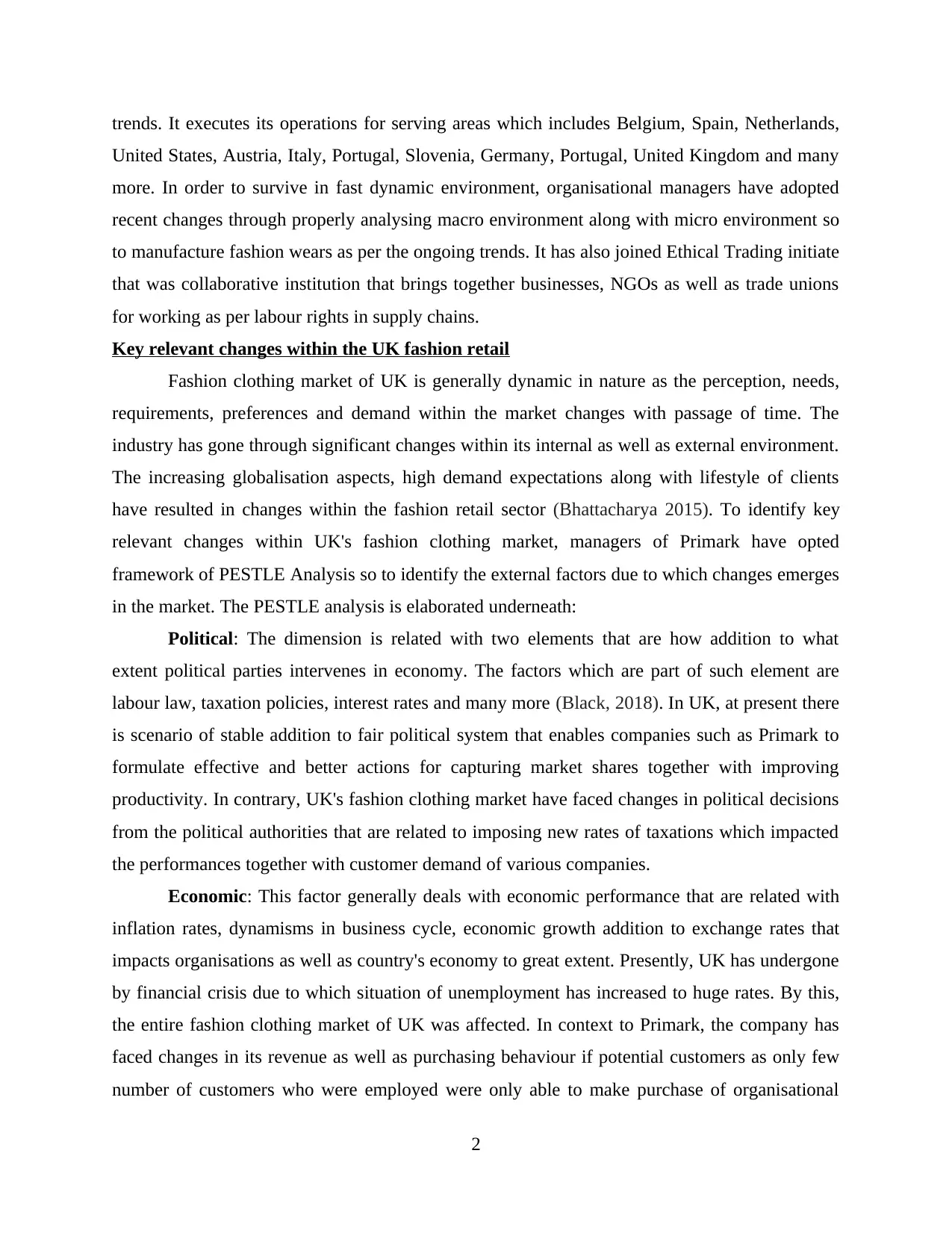
trends. It executes its operations for serving areas which includes Belgium, Spain, Netherlands,
United States, Austria, Italy, Portugal, Slovenia, Germany, Portugal, United Kingdom and many
more. In order to survive in fast dynamic environment, organisational managers have adopted
recent changes through properly analysing macro environment along with micro environment so
to manufacture fashion wears as per the ongoing trends. It has also joined Ethical Trading initiate
that was collaborative institution that brings together businesses, NGOs as well as trade unions
for working as per labour rights in supply chains.
Key relevant changes within the UK fashion retail
Fashion clothing market of UK is generally dynamic in nature as the perception, needs,
requirements, preferences and demand within the market changes with passage of time. The
industry has gone through significant changes within its internal as well as external environment.
The increasing globalisation aspects, high demand expectations along with lifestyle of clients
have resulted in changes within the fashion retail sector (Bhattacharya 2015). To identify key
relevant changes within UK's fashion clothing market, managers of Primark have opted
framework of PESTLE Analysis so to identify the external factors due to which changes emerges
in the market. The PESTLE analysis is elaborated underneath:
Political: The dimension is related with two elements that are how addition to what
extent political parties intervenes in economy. The factors which are part of such element are
labour law, taxation policies, interest rates and many more (Black, 2018). In UK, at present there
is scenario of stable addition to fair political system that enables companies such as Primark to
formulate effective and better actions for capturing market shares together with improving
productivity. In contrary, UK's fashion clothing market have faced changes in political decisions
from the political authorities that are related to imposing new rates of taxations which impacted
the performances together with customer demand of various companies.
Economic: This factor generally deals with economic performance that are related with
inflation rates, dynamisms in business cycle, economic growth addition to exchange rates that
impacts organisations as well as country's economy to great extent. Presently, UK has undergone
by financial crisis due to which situation of unemployment has increased to huge rates. By this,
the entire fashion clothing market of UK was affected. In context to Primark, the company has
faced changes in its revenue as well as purchasing behaviour if potential customers as only few
number of customers who were employed were only able to make purchase of organisational
2
United States, Austria, Italy, Portugal, Slovenia, Germany, Portugal, United Kingdom and many
more. In order to survive in fast dynamic environment, organisational managers have adopted
recent changes through properly analysing macro environment along with micro environment so
to manufacture fashion wears as per the ongoing trends. It has also joined Ethical Trading initiate
that was collaborative institution that brings together businesses, NGOs as well as trade unions
for working as per labour rights in supply chains.
Key relevant changes within the UK fashion retail
Fashion clothing market of UK is generally dynamic in nature as the perception, needs,
requirements, preferences and demand within the market changes with passage of time. The
industry has gone through significant changes within its internal as well as external environment.
The increasing globalisation aspects, high demand expectations along with lifestyle of clients
have resulted in changes within the fashion retail sector (Bhattacharya 2015). To identify key
relevant changes within UK's fashion clothing market, managers of Primark have opted
framework of PESTLE Analysis so to identify the external factors due to which changes emerges
in the market. The PESTLE analysis is elaborated underneath:
Political: The dimension is related with two elements that are how addition to what
extent political parties intervenes in economy. The factors which are part of such element are
labour law, taxation policies, interest rates and many more (Black, 2018). In UK, at present there
is scenario of stable addition to fair political system that enables companies such as Primark to
formulate effective and better actions for capturing market shares together with improving
productivity. In contrary, UK's fashion clothing market have faced changes in political decisions
from the political authorities that are related to imposing new rates of taxations which impacted
the performances together with customer demand of various companies.
Economic: This factor generally deals with economic performance that are related with
inflation rates, dynamisms in business cycle, economic growth addition to exchange rates that
impacts organisations as well as country's economy to great extent. Presently, UK has undergone
by financial crisis due to which situation of unemployment has increased to huge rates. By this,
the entire fashion clothing market of UK was affected. In context to Primark, the company has
faced changes in its revenue as well as purchasing behaviour if potential customers as only few
number of customers who were employed were only able to make purchase of organisational
2

commodities. As a result, changes in economic patter are analysed by the entity within the
market.
Social: Social along with cultural changes are major concentration of social factors. As
huge entities exists in the fashion market, the customers demand and requirements are increasing
for the wearable products (Cox and Dannehl, 2017). In UK, major changes are noticed in the
fashion clothing market are related to mode of delivering commodities to the customers.
Increasing customer demand because of wider good availability, they are demanding more to buy
commodities through online mode or faster delivery channels and due to this, organisations like
Primark are forced to adopt effective delivery system for satisfying the increasing customer
demand on time and to improve its efficiency.
Technological: Technological factor is related to adapting innovative technology for
attaining huge output level. As various technological aspects are adopted within UK's fashion
clothing market, it has emerged as one of leading change in the sector. Technological
improvements impacts great within fashion sector of a country due to higher advancement along
with technological usage to design something new. The UK's fashion market have also
undergone with wide technological changes due to emerging usage of innovative techniques for
manufacturing and delivering products to people living at distant places and also enhances
communication among organisation and customer. Due to technological changes, managers of
Primark are able to enlarge the growth together with sustainability.
Legal: The factor comprises regulations, rules, policies and many more that are governed
by nation's government so to benefit the country economy together with organisational
expansion. In present time, the UK political system have modified the provisions of Minimum
standards that were related to wages (Fernie, Fernie and Moore, 2015). Other than this, various
other legislations are also modified by the government related to safety and welfare in the
clothing market of UK. The nations government has also became strict and for this they have
taken huge measures for discrimination factor and many more. However, Primark managers are
effective enough to manage the working in ethical ways and they were already providing fair
compensation to manpower that enhances their morale which helps entity to achieve higher
profitability level.
Environmental: The dimensions of environmental factor basically deals with preventing
hurdles in the environment through using eco friendly products. As the consumer perceptions are
3
market.
Social: Social along with cultural changes are major concentration of social factors. As
huge entities exists in the fashion market, the customers demand and requirements are increasing
for the wearable products (Cox and Dannehl, 2017). In UK, major changes are noticed in the
fashion clothing market are related to mode of delivering commodities to the customers.
Increasing customer demand because of wider good availability, they are demanding more to buy
commodities through online mode or faster delivery channels and due to this, organisations like
Primark are forced to adopt effective delivery system for satisfying the increasing customer
demand on time and to improve its efficiency.
Technological: Technological factor is related to adapting innovative technology for
attaining huge output level. As various technological aspects are adopted within UK's fashion
clothing market, it has emerged as one of leading change in the sector. Technological
improvements impacts great within fashion sector of a country due to higher advancement along
with technological usage to design something new. The UK's fashion market have also
undergone with wide technological changes due to emerging usage of innovative techniques for
manufacturing and delivering products to people living at distant places and also enhances
communication among organisation and customer. Due to technological changes, managers of
Primark are able to enlarge the growth together with sustainability.
Legal: The factor comprises regulations, rules, policies and many more that are governed
by nation's government so to benefit the country economy together with organisational
expansion. In present time, the UK political system have modified the provisions of Minimum
standards that were related to wages (Fernie, Fernie and Moore, 2015). Other than this, various
other legislations are also modified by the government related to safety and welfare in the
clothing market of UK. The nations government has also became strict and for this they have
taken huge measures for discrimination factor and many more. However, Primark managers are
effective enough to manage the working in ethical ways and they were already providing fair
compensation to manpower that enhances their morale which helps entity to achieve higher
profitability level.
Environmental: The dimensions of environmental factor basically deals with preventing
hurdles in the environment through using eco friendly products. As the consumer perceptions are
3
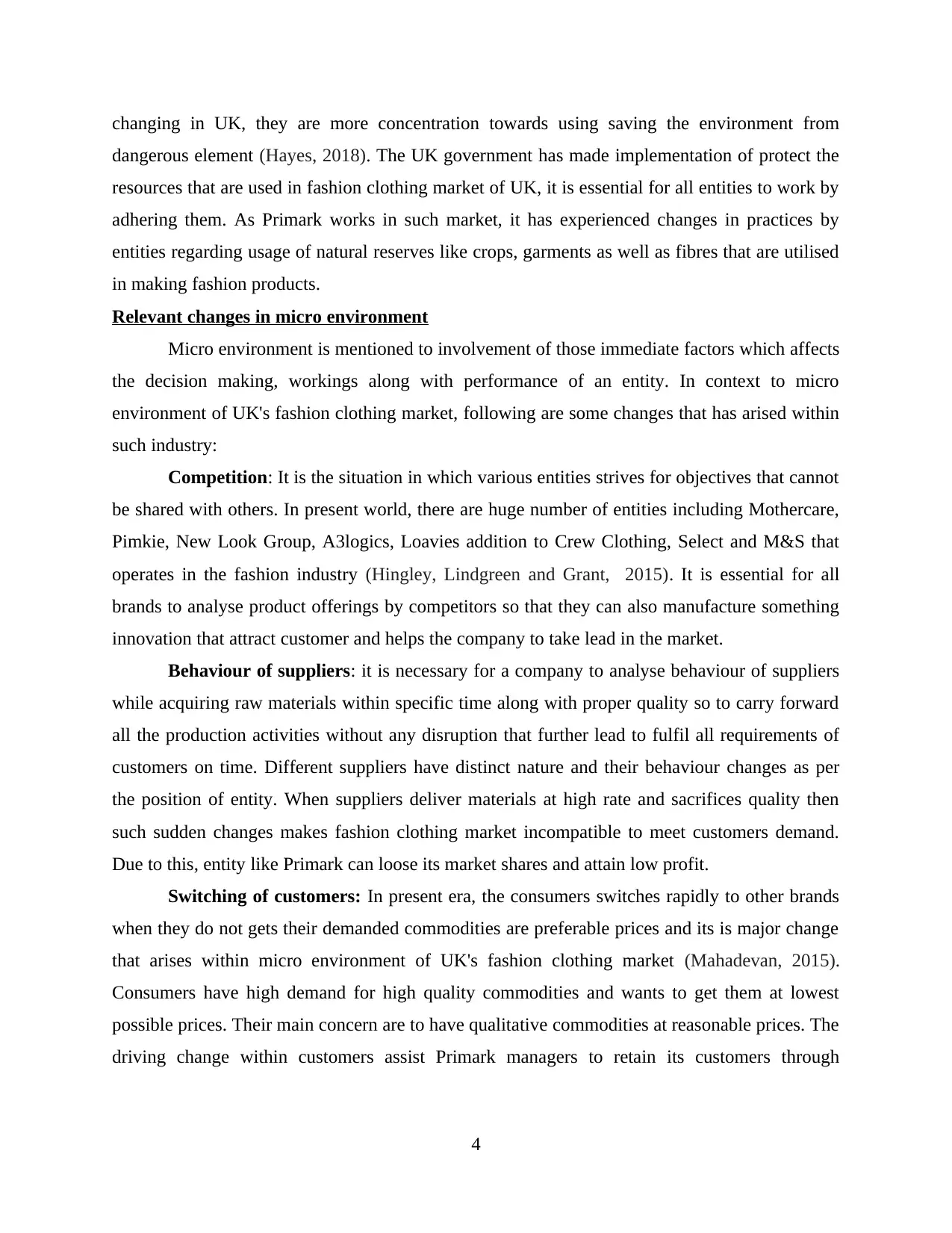
changing in UK, they are more concentration towards using saving the environment from
dangerous element (Hayes, 2018). The UK government has made implementation of protect the
resources that are used in fashion clothing market of UK, it is essential for all entities to work by
adhering them. As Primark works in such market, it has experienced changes in practices by
entities regarding usage of natural reserves like crops, garments as well as fibres that are utilised
in making fashion products.
Relevant changes in micro environment
Micro environment is mentioned to involvement of those immediate factors which affects
the decision making, workings along with performance of an entity. In context to micro
environment of UK's fashion clothing market, following are some changes that has arised within
such industry:
Competition: It is the situation in which various entities strives for objectives that cannot
be shared with others. In present world, there are huge number of entities including Mothercare,
Pimkie, New Look Group, A3logics, Loavies addition to Crew Clothing, Select and M&S that
operates in the fashion industry (Hingley, Lindgreen and Grant, 2015). It is essential for all
brands to analyse product offerings by competitors so that they can also manufacture something
innovation that attract customer and helps the company to take lead in the market.
Behaviour of suppliers: it is necessary for a company to analyse behaviour of suppliers
while acquiring raw materials within specific time along with proper quality so to carry forward
all the production activities without any disruption that further lead to fulfil all requirements of
customers on time. Different suppliers have distinct nature and their behaviour changes as per
the position of entity. When suppliers deliver materials at high rate and sacrifices quality then
such sudden changes makes fashion clothing market incompatible to meet customers demand.
Due to this, entity like Primark can loose its market shares and attain low profit.
Switching of customers: In present era, the consumers switches rapidly to other brands
when they do not gets their demanded commodities are preferable prices and its is major change
that arises within micro environment of UK's fashion clothing market (Mahadevan, 2015).
Consumers have high demand for high quality commodities and wants to get them at lowest
possible prices. Their main concern are to have qualitative commodities at reasonable prices. The
driving change within customers assist Primark managers to retain its customers through
4
dangerous element (Hayes, 2018). The UK government has made implementation of protect the
resources that are used in fashion clothing market of UK, it is essential for all entities to work by
adhering them. As Primark works in such market, it has experienced changes in practices by
entities regarding usage of natural reserves like crops, garments as well as fibres that are utilised
in making fashion products.
Relevant changes in micro environment
Micro environment is mentioned to involvement of those immediate factors which affects
the decision making, workings along with performance of an entity. In context to micro
environment of UK's fashion clothing market, following are some changes that has arised within
such industry:
Competition: It is the situation in which various entities strives for objectives that cannot
be shared with others. In present world, there are huge number of entities including Mothercare,
Pimkie, New Look Group, A3logics, Loavies addition to Crew Clothing, Select and M&S that
operates in the fashion industry (Hingley, Lindgreen and Grant, 2015). It is essential for all
brands to analyse product offerings by competitors so that they can also manufacture something
innovation that attract customer and helps the company to take lead in the market.
Behaviour of suppliers: it is necessary for a company to analyse behaviour of suppliers
while acquiring raw materials within specific time along with proper quality so to carry forward
all the production activities without any disruption that further lead to fulfil all requirements of
customers on time. Different suppliers have distinct nature and their behaviour changes as per
the position of entity. When suppliers deliver materials at high rate and sacrifices quality then
such sudden changes makes fashion clothing market incompatible to meet customers demand.
Due to this, entity like Primark can loose its market shares and attain low profit.
Switching of customers: In present era, the consumers switches rapidly to other brands
when they do not gets their demanded commodities are preferable prices and its is major change
that arises within micro environment of UK's fashion clothing market (Mahadevan, 2015).
Consumers have high demand for high quality commodities and wants to get them at lowest
possible prices. Their main concern are to have qualitative commodities at reasonable prices. The
driving change within customers assist Primark managers to retain its customers through
4
Paraphrase This Document
Need a fresh take? Get an instant paraphrase of this document with our AI Paraphraser
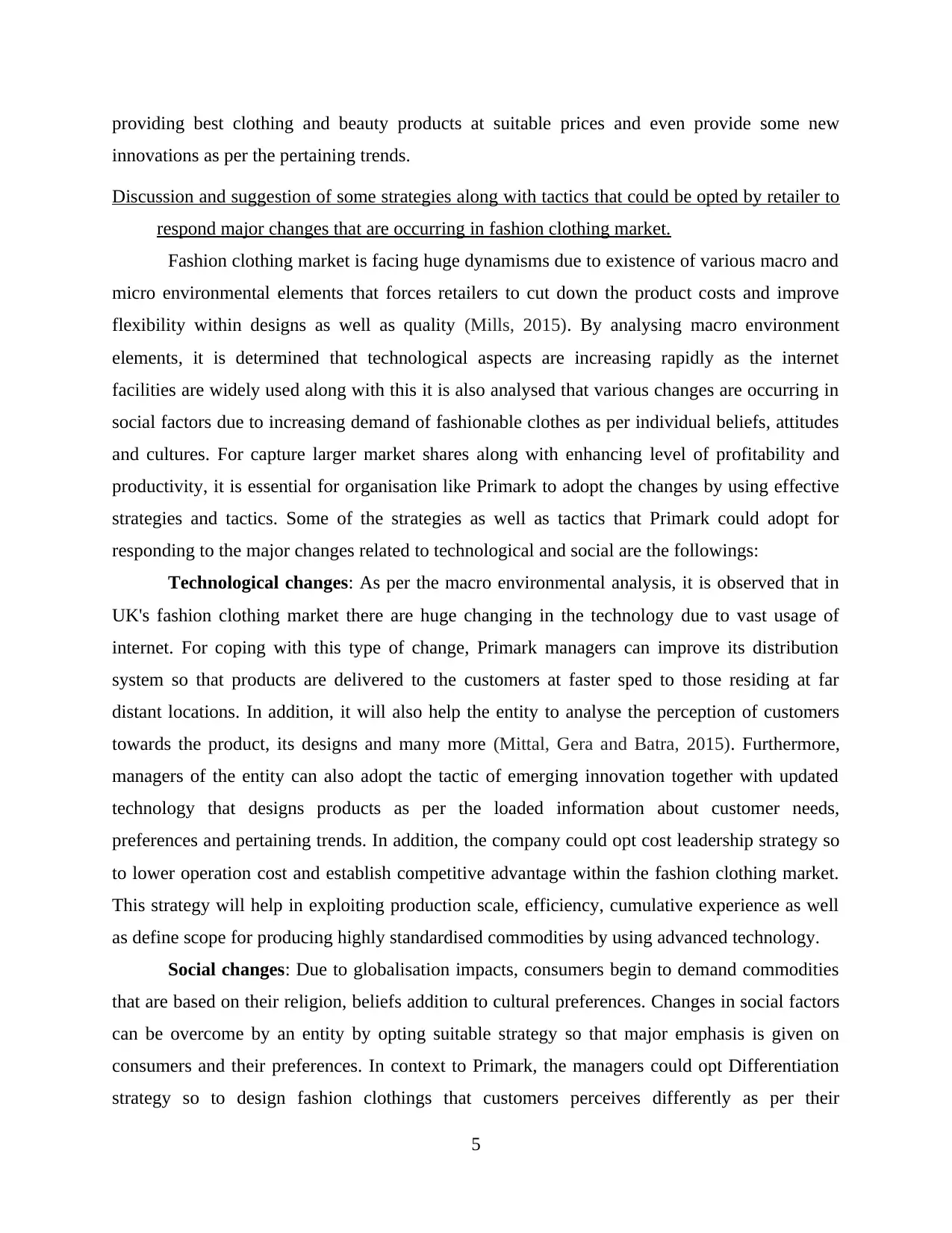
providing best clothing and beauty products at suitable prices and even provide some new
innovations as per the pertaining trends.
Discussion and suggestion of some strategies along with tactics that could be opted by retailer to
respond major changes that are occurring in fashion clothing market.
Fashion clothing market is facing huge dynamisms due to existence of various macro and
micro environmental elements that forces retailers to cut down the product costs and improve
flexibility within designs as well as quality (Mills, 2015). By analysing macro environment
elements, it is determined that technological aspects are increasing rapidly as the internet
facilities are widely used along with this it is also analysed that various changes are occurring in
social factors due to increasing demand of fashionable clothes as per individual beliefs, attitudes
and cultures. For capture larger market shares along with enhancing level of profitability and
productivity, it is essential for organisation like Primark to adopt the changes by using effective
strategies and tactics. Some of the strategies as well as tactics that Primark could adopt for
responding to the major changes related to technological and social are the followings:
Technological changes: As per the macro environmental analysis, it is observed that in
UK's fashion clothing market there are huge changing in the technology due to vast usage of
internet. For coping with this type of change, Primark managers can improve its distribution
system so that products are delivered to the customers at faster sped to those residing at far
distant locations. In addition, it will also help the entity to analyse the perception of customers
towards the product, its designs and many more (Mittal, Gera and Batra, 2015). Furthermore,
managers of the entity can also adopt the tactic of emerging innovation together with updated
technology that designs products as per the loaded information about customer needs,
preferences and pertaining trends. In addition, the company could opt cost leadership strategy so
to lower operation cost and establish competitive advantage within the fashion clothing market.
This strategy will help in exploiting production scale, efficiency, cumulative experience as well
as define scope for producing highly standardised commodities by using advanced technology.
Social changes: Due to globalisation impacts, consumers begin to demand commodities
that are based on their religion, beliefs addition to cultural preferences. Changes in social factors
can be overcome by an entity by opting suitable strategy so that major emphasis is given on
consumers and their preferences. In context to Primark, the managers could opt Differentiation
strategy so to design fashion clothings that customers perceives differently as per their
5
innovations as per the pertaining trends.
Discussion and suggestion of some strategies along with tactics that could be opted by retailer to
respond major changes that are occurring in fashion clothing market.
Fashion clothing market is facing huge dynamisms due to existence of various macro and
micro environmental elements that forces retailers to cut down the product costs and improve
flexibility within designs as well as quality (Mills, 2015). By analysing macro environment
elements, it is determined that technological aspects are increasing rapidly as the internet
facilities are widely used along with this it is also analysed that various changes are occurring in
social factors due to increasing demand of fashionable clothes as per individual beliefs, attitudes
and cultures. For capture larger market shares along with enhancing level of profitability and
productivity, it is essential for organisation like Primark to adopt the changes by using effective
strategies and tactics. Some of the strategies as well as tactics that Primark could adopt for
responding to the major changes related to technological and social are the followings:
Technological changes: As per the macro environmental analysis, it is observed that in
UK's fashion clothing market there are huge changing in the technology due to vast usage of
internet. For coping with this type of change, Primark managers can improve its distribution
system so that products are delivered to the customers at faster sped to those residing at far
distant locations. In addition, it will also help the entity to analyse the perception of customers
towards the product, its designs and many more (Mittal, Gera and Batra, 2015). Furthermore,
managers of the entity can also adopt the tactic of emerging innovation together with updated
technology that designs products as per the loaded information about customer needs,
preferences and pertaining trends. In addition, the company could opt cost leadership strategy so
to lower operation cost and establish competitive advantage within the fashion clothing market.
This strategy will help in exploiting production scale, efficiency, cumulative experience as well
as define scope for producing highly standardised commodities by using advanced technology.
Social changes: Due to globalisation impacts, consumers begin to demand commodities
that are based on their religion, beliefs addition to cultural preferences. Changes in social factors
can be overcome by an entity by opting suitable strategy so that major emphasis is given on
consumers and their preferences. In context to Primark, the managers could opt Differentiation
strategy so to design fashion clothings that customers perceives differently as per their
5

importances to them. In addition, the company can also opt tactic of strategic action wherein they
can create buzz, create niche market and communicate with different market segments so to
entail product development as per culture and religion of customers (Molenaar, 2016). Through
this, the entity will be able to gain unique competitive position and can attract huge customer
base. Moreover, for overcoming social changes, opting customer focused strategy will also
benefit in designing and manufacturing clothings as per customers specialised wants and
delivering quality commodities at reasonable prices so that the social and cultural changes may
be overcome effectively.
Strategies for meeting changing of micro environmental factors
In micro environment, the identified changes are in customer switching, competition as
well as suppliers behaviour. In order to overcome the changes within customer switching,
Primark managers could opt re-evaluating pricing strategy in which the managers re-evaluate
their pricing decisions according to customers beliefs for price and quality so that they are kept
retained for longer time (Sweeney, Grant and Mangan, 2015). In addition, the managers of
Primark can also use tactic of increasing product magnetism in which promotions about products
are done in such manner that resolves all problems of customers are this reduces customer
switching costs to great extent.
CONCLUSION
The above report concluded that retail is mentioned as sale of commodities in small
quantities either for further usage addition to final consumption despite of resaling purposes. In
present scenario, fashion clothing market has emerged as one of booming market within retail
world. For an entity who wishes to sustain for longer period in the retail market, it is very
essential for them to monitor together with analyse changes that are undergoing in the sector.
The relevant changes that are arising in fashion clothing market of a country are related to
technological changes, legislation changes, changes in political governance, economic changes,
social changes and many more. Some of the suggested strategies and tactics like improve
distribution system, adopt emerging innovation along with updated technology, cost leadership
strategy, differentiation strategy and customer focused strategy that retailer can use for
responding major changes that has occurred in fashion clothing market of a country.
6
can create buzz, create niche market and communicate with different market segments so to
entail product development as per culture and religion of customers (Molenaar, 2016). Through
this, the entity will be able to gain unique competitive position and can attract huge customer
base. Moreover, for overcoming social changes, opting customer focused strategy will also
benefit in designing and manufacturing clothings as per customers specialised wants and
delivering quality commodities at reasonable prices so that the social and cultural changes may
be overcome effectively.
Strategies for meeting changing of micro environmental factors
In micro environment, the identified changes are in customer switching, competition as
well as suppliers behaviour. In order to overcome the changes within customer switching,
Primark managers could opt re-evaluating pricing strategy in which the managers re-evaluate
their pricing decisions according to customers beliefs for price and quality so that they are kept
retained for longer time (Sweeney, Grant and Mangan, 2015). In addition, the managers of
Primark can also use tactic of increasing product magnetism in which promotions about products
are done in such manner that resolves all problems of customers are this reduces customer
switching costs to great extent.
CONCLUSION
The above report concluded that retail is mentioned as sale of commodities in small
quantities either for further usage addition to final consumption despite of resaling purposes. In
present scenario, fashion clothing market has emerged as one of booming market within retail
world. For an entity who wishes to sustain for longer period in the retail market, it is very
essential for them to monitor together with analyse changes that are undergoing in the sector.
The relevant changes that are arising in fashion clothing market of a country are related to
technological changes, legislation changes, changes in political governance, economic changes,
social changes and many more. Some of the suggested strategies and tactics like improve
distribution system, adopt emerging innovation along with updated technology, cost leadership
strategy, differentiation strategy and customer focused strategy that retailer can use for
responding major changes that has occurred in fashion clothing market of a country.
6

7
Secure Best Marks with AI Grader
Need help grading? Try our AI Grader for instant feedback on your assignments.
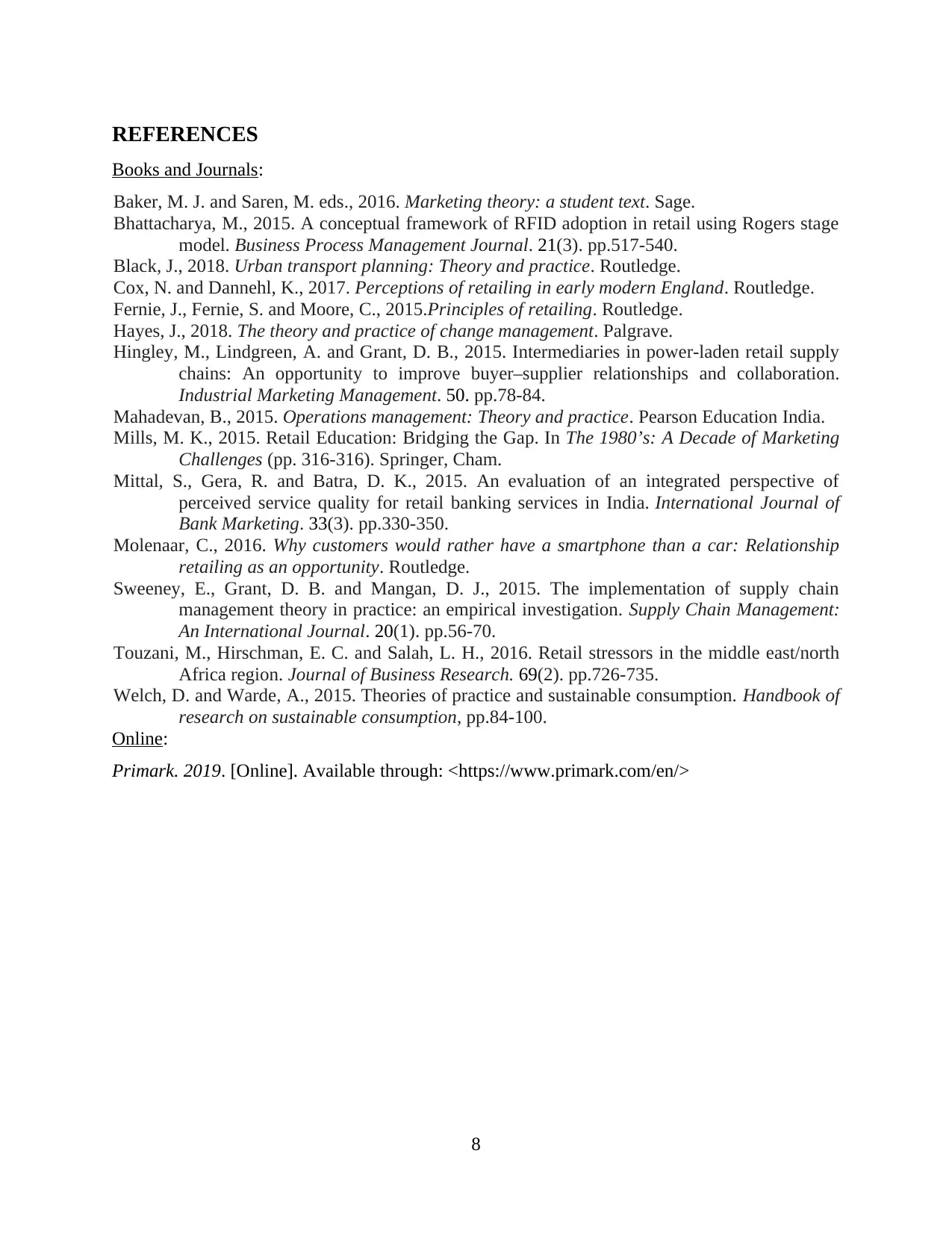
REFERENCES
Books and Journals:
Baker, M. J. and Saren, M. eds., 2016. Marketing theory: a student text. Sage.
Bhattacharya, M., 2015. A conceptual framework of RFID adoption in retail using Rogers stage
model. Business Process Management Journal. 21(3). pp.517-540.
Black, J., 2018. Urban transport planning: Theory and practice. Routledge.
Cox, N. and Dannehl, K., 2017. Perceptions of retailing in early modern England. Routledge.
Fernie, J., Fernie, S. and Moore, C., 2015.Principles of retailing. Routledge.
Hayes, J., 2018. The theory and practice of change management. Palgrave.
Hingley, M., Lindgreen, A. and Grant, D. B., 2015. Intermediaries in power-laden retail supply
chains: An opportunity to improve buyer–supplier relationships and collaboration.
Industrial Marketing Management. 50. pp.78-84.
Mahadevan, B., 2015. Operations management: Theory and practice. Pearson Education India.
Mills, M. K., 2015. Retail Education: Bridging the Gap. In The 1980’s: A Decade of Marketing
Challenges (pp. 316-316). Springer, Cham.
Mittal, S., Gera, R. and Batra, D. K., 2015. An evaluation of an integrated perspective of
perceived service quality for retail banking services in India. International Journal of
Bank Marketing. 33(3). pp.330-350.
Molenaar, C., 2016. Why customers would rather have a smartphone than a car: Relationship
retailing as an opportunity. Routledge.
Sweeney, E., Grant, D. B. and Mangan, D. J., 2015. The implementation of supply chain
management theory in practice: an empirical investigation. Supply Chain Management:
An International Journal. 20(1). pp.56-70.
Touzani, M., Hirschman, E. C. and Salah, L. H., 2016. Retail stressors in the middle east/north
Africa region. Journal of Business Research. 69(2). pp.726-735.
Welch, D. and Warde, A., 2015. Theories of practice and sustainable consumption. Handbook of
research on sustainable consumption, pp.84-100.
Online:
Primark. 2019. [Online]. Available through: <https://www.primark.com/en/>
8
Books and Journals:
Baker, M. J. and Saren, M. eds., 2016. Marketing theory: a student text. Sage.
Bhattacharya, M., 2015. A conceptual framework of RFID adoption in retail using Rogers stage
model. Business Process Management Journal. 21(3). pp.517-540.
Black, J., 2018. Urban transport planning: Theory and practice. Routledge.
Cox, N. and Dannehl, K., 2017. Perceptions of retailing in early modern England. Routledge.
Fernie, J., Fernie, S. and Moore, C., 2015.Principles of retailing. Routledge.
Hayes, J., 2018. The theory and practice of change management. Palgrave.
Hingley, M., Lindgreen, A. and Grant, D. B., 2015. Intermediaries in power-laden retail supply
chains: An opportunity to improve buyer–supplier relationships and collaboration.
Industrial Marketing Management. 50. pp.78-84.
Mahadevan, B., 2015. Operations management: Theory and practice. Pearson Education India.
Mills, M. K., 2015. Retail Education: Bridging the Gap. In The 1980’s: A Decade of Marketing
Challenges (pp. 316-316). Springer, Cham.
Mittal, S., Gera, R. and Batra, D. K., 2015. An evaluation of an integrated perspective of
perceived service quality for retail banking services in India. International Journal of
Bank Marketing. 33(3). pp.330-350.
Molenaar, C., 2016. Why customers would rather have a smartphone than a car: Relationship
retailing as an opportunity. Routledge.
Sweeney, E., Grant, D. B. and Mangan, D. J., 2015. The implementation of supply chain
management theory in practice: an empirical investigation. Supply Chain Management:
An International Journal. 20(1). pp.56-70.
Touzani, M., Hirschman, E. C. and Salah, L. H., 2016. Retail stressors in the middle east/north
Africa region. Journal of Business Research. 69(2). pp.726-735.
Welch, D. and Warde, A., 2015. Theories of practice and sustainable consumption. Handbook of
research on sustainable consumption, pp.84-100.
Online:
Primark. 2019. [Online]. Available through: <https://www.primark.com/en/>
8
1 out of 11
Related Documents
Your All-in-One AI-Powered Toolkit for Academic Success.
+13062052269
info@desklib.com
Available 24*7 on WhatsApp / Email
![[object Object]](/_next/static/media/star-bottom.7253800d.svg)
Unlock your academic potential
© 2024 | Zucol Services PVT LTD | All rights reserved.





